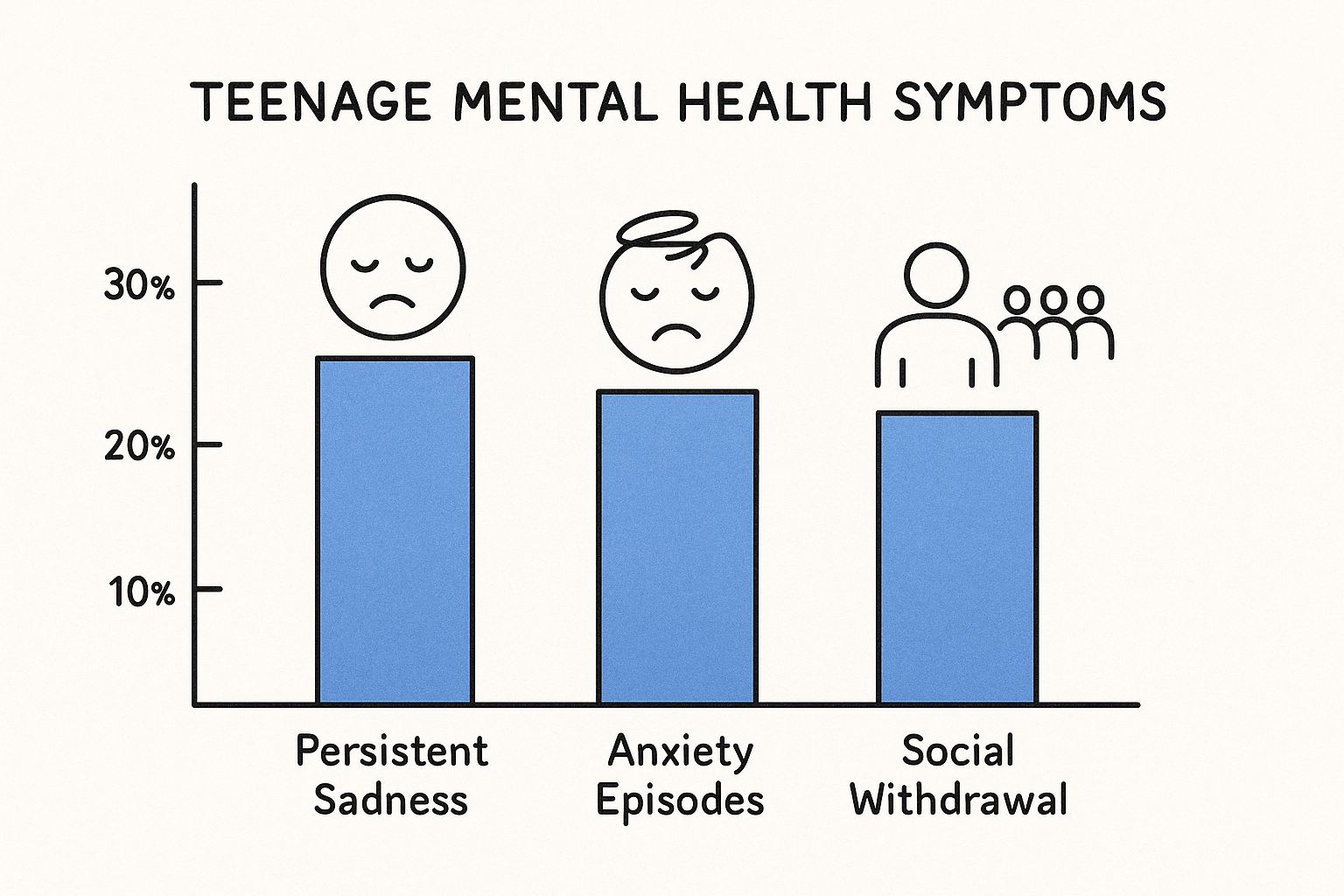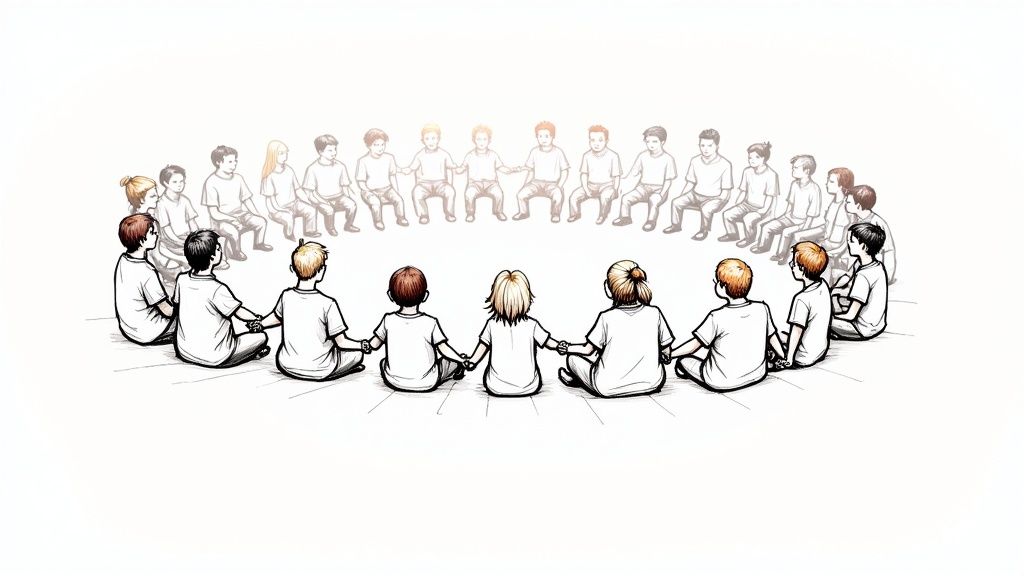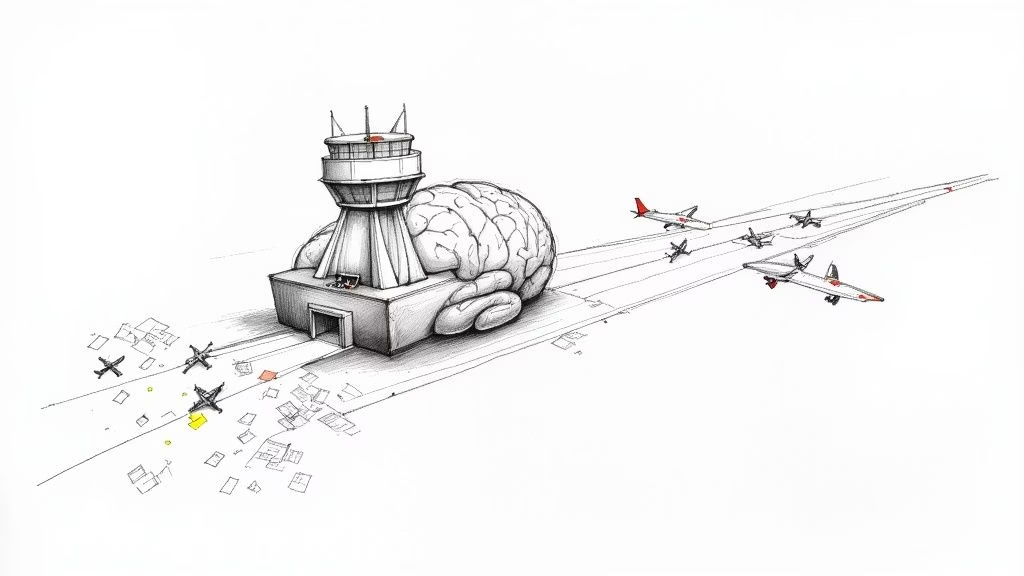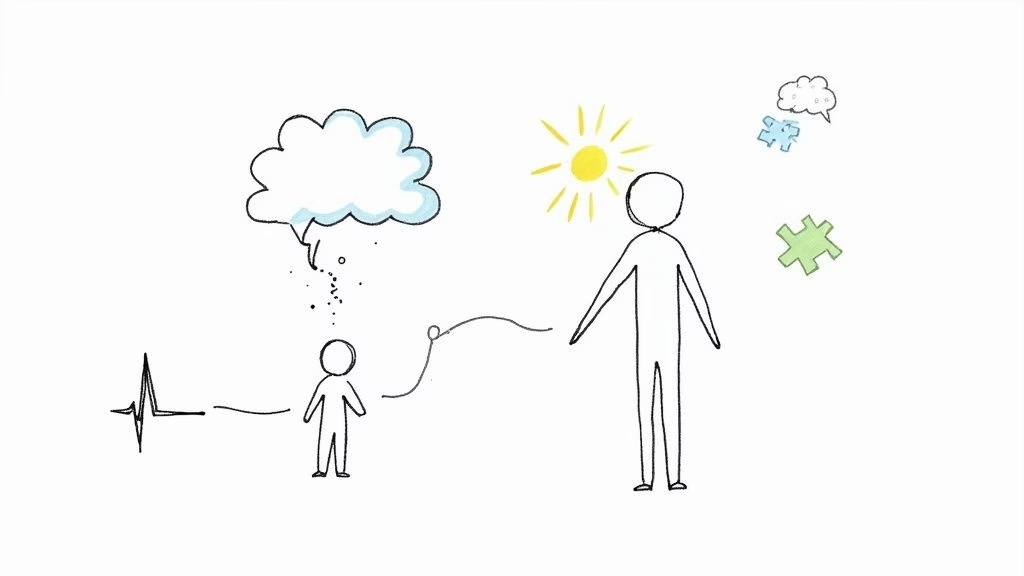Teenage mental health awareness isn't just a buzzword; it's about getting to grips with the fact that young people today are navigating a world loaded with pressures that previous generations simply didn't face. We need to recognize how the constant hum of social media, intense academic stress, and a backdrop of global uncertainty all weave together, affecting everything from their motivation to their fundamental sense of well-being.
Understanding The World Modern Teens Navigate

If you're a parent, the first step is admitting a hard truth: your teen’s world looks almost nothing like the one you grew up in. Their social lives are broadcast for everyone to see, the pressure cooker of school is relentless, and the future can feel incredibly unstable.
Think of it like they're living in a massive, sprawling digital city. It's full of amazing connections and opportunities, but there are also hidden dangers and immense pressures around every single corner.
This environment of constant connectivity is fueling a very real crisis. In fact, nearly 40% of high school students now report persistent feelings of sadness or hopelessness. These staggering numbers go hand-in-hand with alarming rises in self-harm, with emergency room visits for these issues in the U.S. having doubled in just the last decade.
The New Pressures Of Modern Adolescence
Getting a handle on these modern stressors is the key to offering real support. It’s not about comparing their struggles to what you went through; it's about seeing their experience for what it is. To go a bit deeper, you can learn more about the changing landscape for Gen Z and why teens need more support than ever.
Creating a home where your teen feels safe to be imperfect is everything. We have to send the message that It's Ok To Not Be Ok.
To better understand their world, it helps to break down the primary sources of stress today's teens are up against. The table below outlines these multifaceted challenges.
Key Stressors Affecting Modern Teenagers
| Stressor Category | Description & Impact |
|---|---|
| Academic & Future Pressure | The drive to excel in school, build a flawless college application, and map out a "successful" future is overwhelming. This can easily lead to burnout, intense anxiety, and a paralyzing fear of failure. |
| The Social Media Double-Edged Sword | Platforms like Instagram and TikTok are their social hubs, but they also breed a toxic culture of comparison. Seeing curated, perfect lives online 24/7 can make them feel inadequate, lonely, and anxious. |
| Economic & Global Uncertainty | Teens are growing up hearing about climate change, economic instability, and social division. This constant background noise of crisis can make the future feel bleak and out of their control. |
| Bullying & Social Dynamics | Bullying no longer stops at the school gates; it follows them home on their phones. Navigating complex, often public, social hierarchies is a constant source of stress and can deeply impact self-worth. |
By looking at these stressors together, we can see the full picture. It's not one single thing but the combined weight of all these pressures that can become too much for a young person to handle alone.
"Instead of viewing a teen's challenges through the lens of our own past, we must meet them where they are now—in a world that demands constant performance and offers little room for error."
When you truly grasp this context, you stop being a bystander to their struggles and become an empathetic ally. This awareness is the foundation for everything else, giving you the compassion to build a stronger connection and help your teen find their footing with confidence.
How to Spot the Warning Signs of a Struggling Teen
It’s one of the toughest parts of parenting: trying to figure out if your teen is just going through a moody phase or if something more serious is happening. Is it just a bad week, or are you seeing a pattern that points to a deeper struggle? Improving your teenage mental health awareness really begins with learning how to tell the difference.
Think of it like being a weather forecaster for your teen’s inner world. A single rainy day—a bad mood or a slammed door—is just weather. But when those stormy, overcast days become a persistent pattern that never seems to clear, you’re looking at a change in their emotional climate.
That shift from temporary "weather" to a consistent "climate" is what you need to watch for. Trust your gut. You know your child better than anyone, and if something feels off, it’s worth paying closer attention. The goal isn't to become a doctor overnight, but to observe with care and compassion so you know when it’s time to step in.
Emotional and Behavioral Shifts to Watch For
Often, the clearest signs show up in your teen’s daily behavior and emotional state. A bit of irritability is par for the course during the teenage years, but persistent, major changes are a red flag.
- Intense Mood Swings: Look for dramatic shifts that seem to come out of nowhere—from explosive anger to deep, inconsolable sadness.
- Loss of Interest: Pay attention if they suddenly ghost hobbies they once loved. Did they drop the soccer team, leave their guitar to collect dust, or stop hanging out with friends?
- Changes in Sleep: This can swing in either direction. Are they sleeping way more than usual and still exhausted, or are they battling insomnia and up all night?
- Withdrawal and Isolation: A teen who consistently hides out in their room, dodges family time, and pulls away from their social circle might be trying to cope with something big.
These signs can be subtle at first, but when they start to feel like the new normal, it’s a clear signal to look closer. If these behaviors are happening more and more, it might be helpful to learn some specific strategies for anxiety help for teens.
Academic and Social Warning Signs
A teen's internal struggles almost always ripple outward, impacting their schoolwork and friendships. For many, a sudden drop in motivation or a change in their social life is the first sign we see.
Take procrastination, for example. It's rarely about laziness. More often, it’s a symptom of feeling completely overwhelmed, anxious, or paralyzed by a fear of not being good enough. When a once-dedicated student suddenly stops caring about their grades or handing in assignments, that's a huge indicator of distress.
Similarly, a sudden shift in their friend group or complete social withdrawal can signal that they're having a hard time. This isn't just a local issue; it's a global one. One in seven young people aged 10 to 19 deals with a mental health disorder, with anxiety and depression leading the charge. Worldwide, approximately 14.3% of adolescents have conditions that often fly under the radar, which you can read more about in these global adolescent mental health trends.
Trusting your parental intuition is powerful. If you notice a consistent pattern of negative changes—even if your teen insists they're 'fine'—it's a sign that they need your support and understanding more than ever.
Supporting Young Men Who Are Struggling
It’s especially important to raise teenage mental health awareness for boys, who often face intense social pressure to "be tough" and push their feelings down. This can make it incredibly difficult for them to admit they're not okay or to ask for help.
For young men, the warning signs might look different. Instead of showing sadness, they might express their pain through anger, irritability, or risky behaviors. It's helpful to look for resources like mentorship programs or men's groups that give them a safe space to open up without feeling judged. Organizations like The Mankind Project or even local community centers often have programs designed to help young men connect and share what’s really going on. Helping them see that vulnerability is a strength, not a weakness, is a crucial first step.
Parenting Strategies That Build Resilience and Trust

When we see our teen struggling, it’s natural to want to fix things. But shifting from simply spotting warning signs to taking meaningful action often means we need to change our own approach—moving from problem-solver to trusted ally.
The real goal here is to create a home environment where your teen feels safe enough to be vulnerable. It’s not about having all the answers. It’s about building a foundation of trust so strong that they know they can come to you with their messiest, most confusing feelings. This is where true teenage mental health awareness starts—in the small, everyday moments of connection.
The Art of Listening Without Judgment
When a teenager finally opens up, our parental instincts often scream, "Give advice! Offer a solution!" But more often than not, what they truly need is a sounding board, not a fixer.
This is where active listening comes in. It means putting your phone down, turning off the TV, and giving them your undivided attention. Your job isn't to judge their choices but to get curious about their feelings. A simple shift from "You just need to do this…" to "Wow, that sounds incredibly tough," can make all the difference. It tells them their emotions are valid, which is a powerful message for a teen to hear.
Practical Tips for Fostering Open Communication
Trust isn't built overnight; it's the result of hundreds of small, consistent actions that show you respect them as a person. It’s a marathon, not a sprint.
Here are a few ways to start building that bridge:
- Ask Open-Ended Questions: Instead of a yes-or-no question like, "Did you have a good day?" try something that invites a real story, like, "What was the most interesting part of your day today?"
- Validate Their Feelings: You don't have to agree with their behavior to acknowledge their emotions. Phrases like, "I can see why that would make you so angry," or "It makes complete sense that you're worried about that," show you're on their team.
- Share Your Own Vulnerabilities (Appropriately): Modeling is huge. If you talk about your own tough days and how you cope—"Work was really stressful today, so I’m going for a walk to clear my head"—you teach them that struggling is normal and that healthy coping is a skill we can all learn.
The goal is to make conversations about mental health feel as normal as conversations about physical health. When a teen knows they won't be met with panic or judgment, they are far more likely to come to you when they're truly struggling.
Navigating Motivation and Procrastination at School
School is a massive source of stress for most teens. When we see them procrastinating or losing motivation, it's easy to label it as laziness. But what if we reframed it? Procrastination is often just an emotional reaction to a task that feels overwhelming, scary, or just plain impossible. In fact, research shows a strong link between procrastination and negative feelings like a fear of failure.
Instead of lecturing, try collaborating. Help your teen break that massive history project into tiny, bite-sized pieces. Then, celebrate each small win. This shifts the focus from the intimidating final deadline to the next manageable step, which can do wonders for their anxiety. If you want to explore this further, you can find some great strategies for building resilience in teens to help them tackle academic pressures.
A Quick Meditation Guide for Teens
Let's be real: most teens will roll their eyes at the idea of meditation. The trick is to position it not as some complex spiritual practice, but as a simple "mental reset" button they can press anytime.
The 3-Minute Breathing Space:
- Check In (1 minute): Just sit comfortably and notice what's going on inside. What thoughts are buzzing around? What feelings are you feeling? Any weird sensations in your body? No judgment, just notice.
- Focus on the Breath (1 minute): Now, bring all your attention to your breath. Feel the air coming in and going out. You don't need to change it, just follow it.
- Expand Awareness (1 minute): Let your attention gently expand to include your whole body. Notice your posture, your hands, your feet. Just sit with that feeling for a moment before moving on with your day.
This tiny exercise can be a game-changer for managing overwhelming moments. It’s a tool they can use anywhere, giving them a much-needed sense of control over their inner world.
Helping Your Teen Manage School Stress and Motivation
Let's be honest: school can feel like a pressure cooker for teenagers. The endless cycle of homework, exams, and pressure to plan for the future piles up, often leading to serious burnout and anxiety. As a parent, a key part of teenage mental health awareness is realizing that when your teen struggles with school, it's almost never about laziness. It's about being completely overwhelmed.
When you see your teen putting off a big project, it’s easy to jump to conclusions about their work ethic. But more often than not, procrastination is a defense mechanism against anxiety. The task feels massive, the fear of not doing it perfectly is paralyzing, and pushing it away offers a moment of relief from those intense feelings.
Instead of playing the role of a taskmaster, try being their coach. You can help them break that intimidating project into small, manageable chunks. Suddenly, that unclimbable mountain becomes a series of small, walkable hills. This simple shift in approach helps them build momentum and feel in control again, which is a game-changer for their motivation and mental health.
From Procrastination to Purpose
One of the most powerful things you can do is help your teen find their "why." Grades and test scores can feel abstract and meaningless on their own. The real magic happens when you connect their schoolwork to their personal interests and future ambitions.
For example, if your daughter is obsessed with video game design, her math homework isn't just numbers—it's the foundation for learning to code. If your son is passionate about climate change, his science project becomes a real chance to explore something he actually cares about. This simple reframing helps nurture intrinsic motivation, which is the drive to do something because it’s personally rewarding, not just because it’s assigned.
The image below highlights some of the most common signs parents might see when a teen is struggling with their mental health behind the scenes.

As the data shows, issues like persistent sadness, anxiety, and pulling away from friends are incredibly common. It’s a stark reminder of the internal battles many teens are fighting while juggling external academic demands.
Sometimes, what looks like a motivation problem is actually something else entirely. It can be tough for parents to tell the difference between procrastination driven by anxiety and a genuine lack of energy from burnout.
Procrastination vs. Laziness: A Parent's Guide
This table can help you spot the differences and figure out the best way to offer support.
| Indicator | Sign of Procrastination (Anxiety-Driven) | Sign of Burnout/Lack of Motivation | How Parents Can Help |
|---|---|---|---|
| Effort & Energy | Has energy but avoids specific tasks due to fear of failure. May seem "busy" with other things. | General lethargy, low energy, and lack of interest in most activities, not just school. | Help break tasks into small, non-threatening steps. Focus on starting, not finishing. |
| Emotional State | Appears stressed, anxious, or irritable when the task is mentioned. Expresses guilt over not starting. | Seems apathetic, detached, or emotionally flat. May say things like "I don't care anymore." | Encourage rest and disconnection. Talk about reducing their workload or finding a passion project. |
| Future Outlook | Worries intensely about the consequences of not doing the work (e.g., failing a class, disappointing others). | Expresses feelings of hopelessness or sees no point in the effort. Struggles to see long-term goals. | Connect schoolwork to their personal interests and future goals. Remind them of their strengths. |
| Behavior Pattern | Avoidance is targeted. They might clean their room spotlessly to avoid writing an essay. | Avoidance is widespread across many areas of life—school, hobbies, and social activities. | Check in on their overall well-being. A visit to a doctor or therapist may be needed to rule out depression. |
Understanding the root cause of your teen's inaction is the first step. By responding with empathy and the right kind of support, you can help them move past the roadblock instead of just adding more pressure.
Resources for Teen Boys and Young Men
Due to societal pressures to "be strong," teen boys often have an especially hard time admitting they feel overwhelmed. They're more likely to bottle up their feelings and suffer in silence. It's critical for them to have a space where they feel safe enough to be vulnerable.
Here are a few resources worth looking into:
- Mentorship Programs: A positive male role model can offer guidance and create a safe space for your son to open up about what he's going through.
- Men's Groups: Organizations like The Mankind Project run programs designed to build supportive communities where men and boys can explore their emotions without judgment.
- Online Communities: Well-moderated online forums can give teens a sense of belonging by connecting them with peers who are facing the exact same struggles.
A crucial part of supporting your teen is helping them understand that asking for help is a sign of strength, not weakness. By providing these resources, you give them a clear pathway to seek support.
A Simple Meditation Guide for Teens
When stress is at its peak, having a quick tool to calm the nervous system is a superpower. A lot of teens roll their eyes at the idea of meditation, so try framing it as a "brain hack" or a mental reset button.
Here’s a simple guide you can share with them:
- Find a Quiet Spot: It only takes two minutes. Sit or lie down somewhere comfortable.
- Try Box Breathing: Inhale slowly for a count of four. Hold your breath for four. Exhale slowly for four. Hold your breath again for four.
- Repeat: Keep this cycle going for just one or two minutes. The rhythm helps regulate the nervous system and quiet down those racing, anxious thoughts.
This technique is simple, discreet, and incredibly effective. They can use it before a big test, after a stressful day, or any time they start to feel that sense of overwhelm creeping in. By giving them practical tools for both their schoolwork and their emotions, you’re empowering them to build the resilience they need to navigate their teenage years with more confidence.
A Simple Guide to Mindfulness for Teens

When life feels like a constant barrage of notifications, deadlines, and social pressures, having a mental "reboot" button can feel like a superpower. For teens, mindfulness is exactly that. It's not some complex spiritual chore; it's a practical tool for hitting pause and managing stress.
Think of it as a workout for the brain. Just a few minutes can help build focus and calm in a world that’s constantly pulling their attention in a million different directions.
You have to introduce these ideas with a light touch. Forget the formal lectures. Instead, you can frame it as a simple experiment or a "brain hack" for handling tough moments. Raising teenage mental health awareness at home often starts with these small, accessible practices that don't feel like another thing on their to-do list.
The goal is to give them a skill they can actually use to navigate anxiety, beat procrastination, and deal with the pressures of school. When a teen feels more in control of their inner world, their motivation and well-being can improve dramatically.
A Quick Meditation Guide for Teens
Let's be real—suggesting meditation might earn you an eye-roll. The trick is to keep it simple and action-oriented. Skip the jargon and focus on quick, effective techniques they can use anywhere—right before a test, after a fight with a friend, or anytime they just feel overwhelmed.
Here’s a simple technique they can try:
- Find a comfortable spot where you can sit or lie down for just two or three minutes without being interrupted.
- Try "Box Breathing": Inhale slowly through your nose for a count of four.
- Hold your breath for a count of four.
- Exhale slowly through your mouth for a count of four.
- Hold again at the bottom of the breath for a count of four.
- Repeat this cycle for a minute or two. The simple rhythm helps calm the nervous system and quiet down racing thoughts.
This little exercise is a discreet but powerful way to manage stress right in the moment.
The key to introducing mindfulness is framing it as a tool for self-control and focus, not a requirement. When teens see it as a way to gain an edge over stress, they're far more likely to give it a try.
Resources for Teen Boys and Young Men
It's especially important to have resources ready for teen boys, who are often taught from a young age to bottle things up and avoid showing vulnerability. They might mask anxiety with anger or by withdrawing, making it much harder to see that they're struggling. Creating a safe outlet is crucial.
- Mentorship Programs: Connecting a teen boy with a trusted adult male mentor can provide a judgment-free zone where he can talk about his fears and challenges.
- Men’s Groups: Organizations like The Mankind Project offer structured programs that foster emotional expression and community for young men, teaching them that vulnerability is actually a sign of strength.
- Online Communities: Moderated online forums can connect teen boys with peers who get what they're going through, which can reduce feelings of isolation and provide a real sense of belonging.
These kinds of resources can go a long way in normalizing conversations around mental health for young men.
Parenting Tips to Encourage Mindfulness
Your approach as a parent can make all the difference in whether these tools are adopted or completely rejected. The key is to be a guide, not a director.
- Lead by Example: Model healthy coping mechanisms yourself. Actually say things like, "I'm feeling pretty stressed, so I'm just going to take a few deep breaths before I respond."
- Suggest, Don't Prescribe: Frame mindfulness as an option, not an order. "I've heard box breathing can help before a big game. Want to try it for a minute?"
- Use Modern Tools: Plenty of teens are more open to using an app. Suggest tools like Calm or Headspace, which offer short, guided meditations designed specifically for them. It often makes the whole practice feel more accessible and less like a chore.
By offering these tools without pressure, you empower your teen to build a mental health toolkit they can use for the rest of their lives.
Helping Teen Boys Navigate Their Mental Health
When we talk about teenage mental health, it's crucial to zoom in on the specific hurdles teen boys often face. From a young age, society quietly hands them a script: be strong, don't show weakness, and figure it out on your own. This immense pressure makes it incredibly tough for boys to even admit they're struggling, let alone reach out for help.
If a boy is taught that vulnerability is a weakness, he's more likely to hide his anxiety behind a wall of anger or bury his sadness in silence. As parents, caregivers, and allies, our job is to tear down that wall. We need to build a space where talking about feelings isn't just okay—it's seen as what it truly is: an act of incredible strength.
How to Create a Safe Space for Young Men
Fostering an environment of trust begins with shifting the conversation at home. That means being open about your own emotions and validating theirs without rushing to judgment. When they finally do open up, your primary role is to listen—truly listen—not to immediately jump in with solutions. The goal is to understand their world from their point of view.
It also means paying attention to their digital lives. The online world has a huge influence on adolescent mental health, with problematic social media use increasingly linked to poor outcomes. Research shows that between 2018 and 2022, this issue among teens in Europe, Central Asia, and Canada jumped from 7% to 11%. This spike correlates with an increase in suicide attempts among young people. You can dig deeper into these children's rights and mental health findings to understand the scale of the problem.
The most important thing you can say to a teen boy who is struggling is, "I'm here for you, no matter what. Your struggles don't make you weak; they make you human." That simple validation can be the lifeline they need.
From School Stress to Practical Strategies
The weight of academic expectations is a massive source of anxiety for many teens, often showing up as procrastination or a sudden lack of motivation. For boys conditioned to handle pressure silently, this can be a lonely and confusing spiral. Instead of seeing procrastination as laziness, try to see it for what it often is: a sign that they're completely overwhelmed.
You can help by teaching them how to break down a huge assignment into smaller, less intimidating steps. It’s a simple but powerful strategy that turns a mountain into a series of manageable hills. By coaching them through this, you're not just helping them with homework; you're teaching a life skill and reinforcing that it’s perfectly normal to find things hard.
Resources and Tools That Can Make a Difference
Connecting teen boys with the right support can be a game-changer. They need to see that they aren't the only ones going through this and that other guys are figuring it out, too.
Here are a few places to start looking:
- Men's Groups: Organizations that promote a healthy, modern view of masculinity offer supportive communities where young men can learn to express themselves without being judged.
- Mentorship Programs: A positive adult male role model can offer invaluable guidance, share his own experiences, and show them that real strength and emotional intelligence are two sides of the same coin.
- Online Communities: Carefully vetted online forums can provide peer support, connecting them with others who get exactly what they're going through.
A Simple "Mental Reset" for Teens
A lot of teens are skeptical about meditation, so it helps to introduce it as a practical tool for managing stress and regaining focus. Think of it less as a spiritual practice and more as hitting a "mental reset" button.
Try the 5-4-3-2-1 Grounding Technique:
This exercise is designed to pull them out of an anxious thought loop and back into the present moment.
- Look: Find five different things you can see right now.
- Feel: Notice four things you can physically feel (the chair under you, your feet on the floor).
- Listen: Tune in and identify three distinct sounds.
- Smell: Name two things you can smell.
- Taste: Acknowledge one thing you can taste.
Frequently Asked Questions From Parents
Trying to understand your teen's mental health can feel like you've been handed a map to a country you've never visited, written in a language you don't speak. You want to help, but it's tough to even know where to begin. Here are some straightforward answers to the questions parents ask most, with practical advice to help you support your teen.
What's the First Thing I Should Do If I Think My Teen Is Struggling?
Your very first move should be to connect, not correct. Find a quiet, low-pressure moment to bring up what you’ve noticed. Instead of pointing fingers, use "I" statements that come from a place of genuine concern.
For example, you could say, "I've noticed you seem to be keeping to yourself more than usual lately, and I just wanted to check in because I care about you." The goal isn't to solve everything in one conversation, but simply to open the door and let them know you're ready to listen without judgment.
If they shut down or aren't ready to talk, don't push. Just let them know the door is always open. Your next practical step should be to schedule a visit with their family doctor. This helps rule out any physical causes for their symptoms and is the best way to get a trusted referral to a mental health professional.
How Can I Help My Teen Who Has No Motivation for School and Procrastinates?
When you see a teen's motivation tank and procrastination kick in, it's almost never about being lazy. More often than not, it's a sign they're feeling completely overwhelmed or even paralyzed by a fear of failure.
Instead of lecturing or adding more pressure, try shifting into the role of an ally. Sit with them and help break down that huge, scary research paper into tiny, manageable pieces. Maybe the first step is just opening a new document and writing a title.
Celebrate the small victories—finishing a single paragraph, solving one tough math problem. These little wins build momentum and give them back a sense of control. It also helps to find ways to connect schoolwork to things they actually care about. When they see how chemistry concepts apply to baking their favorite cookies, or how history class relates to the world-building in their favorite video game, learning suddenly has a purpose.
What Are Some Reliable Resources for Teen Mental Health?
Finding support you can trust is absolutely critical. Your best starting points are often right in your community—your teen's school counselor and pediatrician can provide excellent, vetted referrals.
For more general information and support networks, here are a few places to turn:
- National Organizations: The National Alliance on Mental Illness (NAMI) and the American Academy of Child and Adolescent Psychiatry (AACAP) have incredible online resources, including directories to find help.
- Support for Young Men: Look for resources specifically designed for teen boys, like mentorship programs. These create safe spaces where they can open up about the unique pressures they face.
- Mindfulness Tools: Sometimes the simplest things help the most. Introduce them to easy "mental reset" techniques like box breathing or the 5-4-3-2-1 grounding exercise to manage stress in the moment.
For parents who want to dig deeper into the topic, you can find some really helpful perspectives in these expert insights on mental health and psychotherapy.
At Andrew Petrillo Life Coaching, we know that every teenager's path is different. If you're seeking personalized support to help your teen navigate the challenges of motivation, stress, and planning for the future, our coaching programs are designed to give them the tools to thrive. Visit us at https://andrewpetrillolifecoaching.com to book a free discovery call and see how we can help your teen build the confidence and direction they deserve.



















